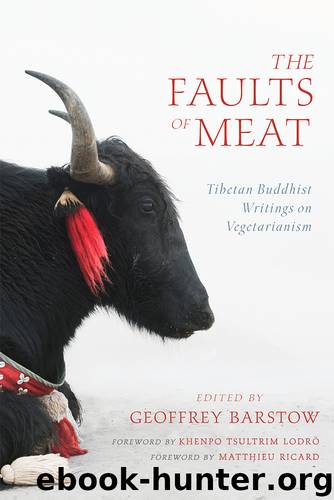The Faults of Meat by Geoffrey Barstow

Author:Geoffrey Barstow
Language: eng
Format: epub
Publisher: Wisdom Publications
274. Tib: Mkhas grub Rje Dge legs dpal bzang.
275. Tib: rje yab sras gsum.
276. For more on Khedrup’s critique of Ngorchen, see Bentor, “Did mKhas Grub Rje Challenge the Authenticity of the Sa Skya Lam ’bras Tradition?”; and Heimbel, “The Dispute between mKhas Grub rJe and Ngor Chen.”
277. Tib: Sdom pa gsum gyi rnam par bzhag pa mdor bsdus te gtan la dbab pa’i rab tu byed pa thub bstan rin po che’i byi dor.
278. For more on the Tibetan three-vow genre, see Sobisch, Three-Vow Theories in Tibetan Buddhism; Dudjom Rinpoche, Perfect Conduct; and Sakya Paṇḍita Kunga Gyaltshen, A Clear Differentiation of the Three Codes.
279. Great Vinaya Text (Tib: ’Dul ba gzhung dam pa) and Exposition of the Vinaya (Tib: ’Dul ba rnam ’byed).
280. Vinayasūtra (Tib: ’Dul ba’i mdo rtsa ba). Despite its title, this is not a sūtra spoken by the Buddha; the Sanskrit word “sūtra” in this context is used in its more general sense to mean aphorisms or notes. For more on this text, see the introduction to Karmapa Mikyö Dorjé’s Great Commentary on the Vinayasūtra in chapter 6 of this volume.
281. Commentary on the Vinayasūtra (Tib: ’Dul ba’i mdo’i rgya cher ’grel pa).
282. Descent onto Laṅkā Sūtra (Tib: Lang kar gshegs pa’i mdo). For a translation of the relevant portions of this text and its role in Tibetan debates on meat eating, see chapter 1 of this volume.
283. Compendium of Training (Tib: Bslab pa kun las btus pa). For a full translation, see Goodman, The Training Anthology of Śāntideva.
284. For an extended passage in which the nineteenth-century Shabkar depicts Khedrup as almost entirely opposed to meat eating, see Shabkar, Food of Bodhisattvas, 87–90, 105–6, 112, 117–18.
285. Vinaya Chapters (Tib: ’Dul ba’i gzhi).
286. Verses on the Heart of Madhyamaka (Tib: Dbu ma’i snying po’i tshig le’ur byas pa) and Blaze of Reasoning (Tib: Dbu ma’i snying po’i ’grel pa rtog ge ’bar ba). For more on these texts, see Eckel, Bhāviveka and His Buddhist Opponents; Hoonaert, “An Annotated Translation of Madhyamakahṛdayakārikā/Tarkajvālā V.69-84”; and Hyoung Seok Ham, “Buddhist Critiques of the Veda and Vedic Sacrifice.”
287. For more on Bhāviveka’s arguments, including a translation of some of the relevant passages, see Catherine Hardie’s translation of Khenpo Tsultrim Lodrö’s Clear Mirror in chapter 12 of this volume.
288. Rje yab sras kyi gsung rtsom nyer mkho phyogs bsgrigs, 253–554.
289. Khedrup Jé, Sdom pa gsum gyi rnam par bzhag pa mdor bsdus (1980–1982).
290. Khedrup Jé, Sdom pa gsum gyi rnam par bzhag pa mdor bsdus (n.d.).
291. Forthcoming in the composite volume The Ethics of the Three Codes, The Library of Tibetan Classics, vol. 12 (Somerville, MA: Wisdom Publications in association with the Institute of Tibetan Classics), as Khedrup Jé’s Dusting Off the Precious Teaching of the Buddha (Thub bstan rin po che’i byi dor).
292. I have added topical subheadings throughout this text. These are not found in Khedrup’s Tibetan but are inserted in order to help orient the reader.
293. I have chosen to translate the Tibetan, rabjung (rab byung; Skt: pravrajyā), as “monk,” and the Tibetan, gelong (dge slong; Skt: bhikṣu), as “fully ordained monk.
Download
This site does not store any files on its server. We only index and link to content provided by other sites. Please contact the content providers to delete copyright contents if any and email us, we'll remove relevant links or contents immediately.
| Non-Vegan Vegetarian | Vegan |
Dinner in an Instant by Melissa Clark(3163)
Ottolenghi - The Cookbook by Yotam Ottolenghi(2946)
Oh She Glows Every Day by Angela Liddon(2781)
Veg by Jamie Oliver(2490)
Superfood Smoothie Bowls: Delicious, Satisfying, Protein-Packed Blends that Boost Energy and Burn Fat by Chace Daniella(2484)
The Starter Garden Handbook by Alice Mary Alvrez(2339)
Wanderlust by Jeff Krasno(2254)
Eat With Intention by Cassandra Bodzak(2205)
The Main Street Vegan Academy Cookbook by Victoria Moran(2089)
Vegan Desserts by Hannah Kaminsky(2086)
QUESO! by Lisa Fain(1995)
2250 Pressure Cooker, Crock Pot, Instant Pot and Slow Cooking Recipes Cookbook: (Crock-Pot Meals, Instant Pot Cookbook, Slow Cooker, Pressure Cooker Recipes, Slow Cooking, Paleo, Vegan, Healthy) by Jamie Stewart(1979)
Eat and Run by Scott Jurek(1956)
Stuff Every Vegetarian Should Know by Katherine McGuire(1917)
Vegetarian Times Plant-Powered Protein Cookbook by Editors of Vegetarian Times(1873)
Oh She Glows for Dinner by Angela Liddon(1813)
Healing the Vegan Way : Plant-based Eating for Optimal Health and Wellness (9780738217789) by Reinfeld Mark(1782)
Alternative Vegan by Marie Reginato(1769)
The Plant-Based Dog Food Revolution by Mimi Kirk(1713)
